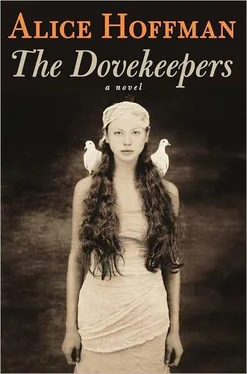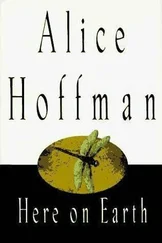Alice Hoffman - The Dovekeepers
Здесь есть возможность читать онлайн «Alice Hoffman - The Dovekeepers» весь текст электронной книги совершенно бесплатно (целиком полную версию без сокращений). В некоторых случаях можно слушать аудио, скачать через торрент в формате fb2 и присутствует краткое содержание. Год выпуска: 2011, ISBN: 2011, Жанр: Историческая проза, на английском языке. Описание произведения, (предисловие) а так же отзывы посетителей доступны на портале библиотеки ЛибКат.
- Название:The Dovekeepers
- Автор:
- Жанр:
- Год:2011
- ISBN:978-1-4516-1749-8
- Рейтинг книги:2.5 / 5. Голосов: 2
-
Избранное:Добавить в избранное
- Отзывы:
-
Ваша оценка:
- 60
- 1
- 2
- 3
- 4
- 5
The Dovekeepers: краткое содержание, описание и аннотация
Предлагаем к чтению аннотацию, описание, краткое содержание или предисловие (зависит от того, что написал сам автор книги «The Dovekeepers»). Если вы не нашли необходимую информацию о книге — напишите в комментариях, мы постараемся отыскать её.
The Dovekeepers — читать онлайн бесплатно полную книгу (весь текст) целиком
Ниже представлен текст книги, разбитый по страницам. Система сохранения места последней прочитанной страницы, позволяет с удобством читать онлайн бесплатно книгу «The Dovekeepers», без необходимости каждый раз заново искать на чём Вы остановились. Поставьте закладку, и сможете в любой момент перейти на страницу, на которой закончили чтение.
Интервал:
Закладка:
I would have been happy to live this life forever. To wait for the dark and have Ben Simon when I could, but that was not the way it had been written. At the end of the month of Kislev, when clouds gathered and the nights grew cool, Sia’s sons fell ill. Bad fortune had been lurking every time we ate food that had not been blessed or when we drank from still pools. We had left a place where there were demons, and perhaps some had followed us through Zion’s gates. The children were sweet boys, always ready to tag along to search for figs in the fertile soil of the ravines, at least until their mother protested and would no longer allow them to accompany me. When I asked if I could help with their illness, Sia let me know there was nothing I could do. They weren’t my children, she told me. I saw grief stamped upon her, but I did not offer to share it for I had helped to cause her despair. Of course she wouldn’t want me near.
Day after day the boys’ skins flamed hot, though the air grew cooler. Soon the children made rasping sounds when they tried to breathe. Faint red marks were scattered over their flesh. I could hear Sia weeping when they refused the soup of blanched vetch she offered them. She cried out to Adonai for Him to take her instead of her children. In my deepest heart I had wished for the very same thing. It was terrible, but it was true. I felt my disgrace, yet I wanted her gone from us. This was who I had become and what my craving had done to me. Now when I thought about who would be the first to die, I guessed it would be her.
If you cannot be brutal in the desert, you will never survive. This is what I told myself and what I believed. I was not a donkey or an innocent girl or a worried mother or a boy with a high fever. I was a red-haired woman who had stared down a leopard. I spoke to a goat on a mountainside. I saw that Ben Simon sat watch over his children, the raw planes of his face transformed by worry. I went to him and bowed before him and begged to nurse his children. A curl of a smile formed on his mouth and he stroked my hair, but he said their lives were in God’s hands, not mine.
Sia was watching, her face ashen.
“Let me show you what I can do,” I insisted.
In a single day I caught three wild hens and cooked them over a fire. I found water in a spring that fed an Egyptian sycamore and plucked the orange-colored fruit. I made a hearty soup for the boys, then cut the sycamore fruit into thin, cool slices to hold against their fevered lips.
Sia could not reproach me. She had no choice but to nod blankly and accept my gifts. I plunged into survival. I made it my calling and my art, unlike my father, who spent his time idly gazing toward Jerusalem as the sky edged from white to blue. He, who had killed a dozen Romans, who was a rebel and a renegade, was being bested by Judea, by the wind and the hunger that had claimed him and how helpless he had become. Now that the children had fallen ill, he was terrified, chanting to the Almighty throughout the day. It wasn’t that he cared about the boys, it was his own flesh that concerned him. He insisted that demons could move from one person to another in a touch or a breath. I had contempt for him and turned away. When he asked me for water to wash his hands, I told him to find it himself, to paw through the sand as I had done.
I cared about only one man, the one who had faced a lion. But I feared he was too tenderhearted and had been reclaimed by his wife and family. He had stopped coming to me at night. In my cave I shivered, alone. I suffered and watched from behind the rocks. He sat with the children beside a fire made of the twigs I’d collected, eating the soup I’d made, drinking water I had dug from beneath the sycamore. I was healing them for each other. Once I saw him take Sia’s hand in his own large hand and press her palm to his mouth. He had the right to do so, she was his wife, but I burned with a haze of jealousy. I couldn’t eat the soup I’d cooked. I didn’t drink the water I had found beneath the roots of the sycamore tree.
I knew from the talk of women at the well in Jerusalem that it was possible to bind a man to you and keep him from straying. It was a blood act, they’d said, fearful of such things, but blood did not frighten me. I went off alone to a place where I had seen black adders, where there was a grove of yellow Sodom apples, whose long, fibrous seeds served as wicks when we had enough fat from a partridge to use for the Sabbath light. I crouched down on my haunches and drew the face of a lion in the dirt with a stick, then circled it with stones, which I streaked with my own menstrual blood. I wanted to keep my lion caged, and in this way I imagined I might do so. I had no mother to teach me the simplest cures, but my spell proved successful. Ben Simon came to me that night. He still wanted me. I tied up my hair with my blue scarf. I was careful, and silent, grateful beyond measure. Everything seemed breakable now. What was between us had grown until it was a flower, the red blossom of the flame tree, which stains your fingers when you pick it, twisted onto a vine that pricks your skin.
“I shouldn’t be here,” he said.
The same was true for me, and I should have said as much. Instead I went to him and we denied ourselves nothing. None of us was meant to be in this wilderness, but as it had been written that we should journey here, it had been written that he would come to me. All I wanted was his hands on me, his mouth on mine, his body and mine becoming one. That was when I was alive. I wondered if perhaps I’d set the spell upon myself and if it was a curse I’d have to pay for eventually. I should have allowed Ben Simon to care for his wife and children, but I didn’t let him go. A leopard knows who she is; she does not calculate her prey’s agony and fear, she runs because she is made to do so, she takes what she must.
Perhaps it had been better when I was invisible, when men walked past me and looked away, when I stayed at home like a dog. I barely knew myself now. But I knew what I wanted. When I went walking among the rocks, barefoot, I left a trail. He always followed to find me. Even so, this was not his sin to carry, for when he came to me, I never once said no.
THE NIGHTS grew cooler and the air was blue, sweeping in from the Great Sea, bringing rain in the banks of clouds. Yet the boys’ fevers still hadn’t broken. They had been sick for too long a time. Their lips were swollen and white. Their eyes rolled back, and they talked to spirits. We watched them, uneasy, fearing the worst. It had come to the point where they would not eat or drink. And then one day, when the branches of the tamarisk bloomed with pink flowers and there were clutches of sage rising between the rocks along the cliffs, Sia herself fell ill. She swore there was nothing wrong with her, but she shivered and refused to eat. In the evening she lay down beside her boys, and when the next morning came, she did not rise from the ground. When I brought her water, she accepted it, but the way she looked at me was terrible. Once she clasped my hand and I thought she was about to curse me. Instead, she gazed into my eyes with a fevered intensity. I don’t know if she found what she was searching for, but perhaps she did, for she asked then if I would take care of him should she die. I knew who she meant. I bowed my head and promised I would.
“Yes, of course you will,” she murmured. She didn’t sound angry, rather she appeared to be a woman who had surrendered and no longer needed to bother with the details of those who would remain on earth, except to make certain that the husband she loved would be loved in return.
After that I couldn’t look at her, my only friend who’d been so kind to me. I helped as best I could, crouching beside her with a dampened rag to cool her burning skin. I boiled a tea of nettles and mint, but she couldn’t drink. I made a broth from the bones and meat of a partridge, but she shook her head and turned me away. I had never nursed anyone, nor had I attended to the ill or the dying. She lay there uncomplaining, as did the children, who moaned softly. In Jerusalem the minim could be paid to come with their secret chants. They would pray for cures from the Infinite One, and as masters of pharmaka they had access to medicines that could cure blindness, headaches, fever. The root of the peony could be crushed and digested by those who had seizures; hot wax could stop bleeding. The minim wrote the Almighty’s name a thousand times, the scroll slipped inside a roll of leather, prayers with mysteries so private they could only be whispered to God alone. If I could have, I would have gone to one of the women in the alleyways such as the one I’d turned to for Amram’s amulet, for they often had access to darker spells and could bring back a life the Angel of Death seemed poised to snatch away.
Читать дальшеИнтервал:
Закладка:
Похожие книги на «The Dovekeepers»
Представляем Вашему вниманию похожие книги на «The Dovekeepers» списком для выбора. Мы отобрали схожую по названию и смыслу литературу в надежде предоставить читателям больше вариантов отыскать новые, интересные, ещё непрочитанные произведения.
Обсуждение, отзывы о книге «The Dovekeepers» и просто собственные мнения читателей. Оставьте ваши комментарии, напишите, что Вы думаете о произведении, его смысле или главных героях. Укажите что конкретно понравилось, а что нет, и почему Вы так считаете.












